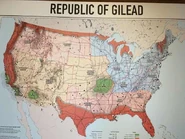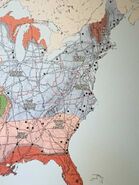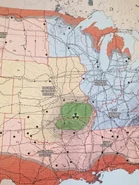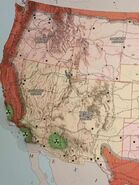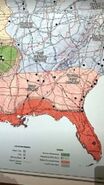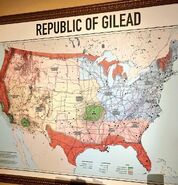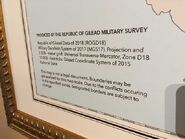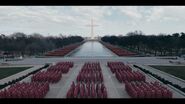m (→Origins) Tag: Visual edit |
m (ProfessorPieixoto moved page Gilead (Series) to Republic of Gilead (Series): Republic of Gilead is the name where the show refers to. "Gilead" is colloquial) |
(No difference)
| |
Revision as of 18:28, 12 February 2020
“This is Gilead. No one gets out.”— Moira names a "disadvantage" of a society practicing slavery and human exploitation[1]
The Republic of Gilead, colloquially referred to as simply Gilead or elsewhere sometimes called, by its leadership, the "Divine Republic", is the totalitarian patriarchal theocracy that rules over most of the territory that belonged to the former continental United States of America in The Handmaid's Tale. The regime that governs it can be seen as the overall antagonist of the television adaptation.
Society and Politics
Administrative Structure
The storyline hasn't detailed how Gilead's government and state function precisely, however a theocratic, inner party of men, more appropriately termed a junta called "Committee" appears to be in charge [2]. They rule from Washington, D.C., which is the capital of the Republic of Gilead and the former United States of America, the remnants of which Gilead has been engaged in an ongoing civil war with over territory and population (particularly women).
However, as Gilead is officially called the "Republic of Gilead," this would indicate that at least to its ruling class it is a republic with a pseudo-democratic electoral process.
Political maps of Gilead reveal that Gilead abolished America's federal system of government and states, and has become a unitary republic with a centralized government and the former states re-organized into larger "districts". On a regional level, Gilead is governed by "Councils" as boards of local Commanders [3].
Gilead borders Canada to the north and the Republic of Texas to the south.
Legislation and Politics
Individual civil liberties as formerly granted by the suspended U.S. Constitution have been replaced by a system of duties and privileges implemented in a hierarchy of social classes, with every former U.S. citizen being assigned to a particular class and expected (and/or forced) to fulfill certain roles (see Society and Class System). Much of this legislation is influenced and justified by a rigid interpretation of scripture. The name Gilead itself is taken from the Bible, referring to several different locations and individuals and generally translated as "hill of testimony."[citation needed]
In particular, Gilead is a patriarchal society, where only men have access to higher education and only they can hold property, a job, or political positions[4].
Women are regarded as second-class citizens as they must submit to the authority of men ("Next male of kin"[4]). Most female classes are forbidden to read or write[5]. The only women who are still allowed to read and write are the Aunts [6] though Wives can hold a considerable amount of political power and influence with their husbands[citation needed].
Some civil rights however are confirmed or assumed to be suspended for good, e.g. freedom of speech (which is considered heresy), freedom of the press[7], freedom of religion[8] and freedom of assembly[4]. The Eyes serve as Gilead's political police force and sends spies to detect and punish infringements and political opponents[8].
Society and Class System
Gilead doesn't practice general equality before the law; while members of different classes can be sentenced variably for identical "crimes" (see Ofglen's case), the individual legal position within one social class appears uniform. In that spirit, the Gileadean class system has "replaced" the suspended U.S. Constitution.
Econopeople
As stated by June (in Baggage), this social 'class' (or group) contains all former U.S. citizens who "played their cards right" and aren't explicitly reassigned into another class. The legal Gileadean gender discrimination (as seen e.g. in Late), however, implies the effective distinction in male and female classes of Econopeople. Furthermore, the flashback scenes in Late suggest male Econopeople can keep some of their pre-Gileadean liberties, like holding down a (remunerated) job or owning property; unlike for females, there aren't any evidences in the show for the existence of male slave labor.
Since young females in Gilead are expected to marry when reaching menarche[9], the social class of "Econowives" (as mentioned in the novel) can be seen as a synonym to female econopeople as portrayed in the show; as to males, it is unknown if there is only one overall class of "Economen" or a more detailed distinction. Since single men of "low status" are "issued" women by chance[10], this may suggest some legal distinction between married and unmarried male Econopeople.
Children
Legal gender discrimination implies different rights to levels of education for boys and girls in Gilead. In particular, girls aren't taught to read or write and they leave school when reaching menarche and marrying[11].
Female Classes
Women are believed to be the "lesser" sex, who should be subject to men. Women's main purpose in this society is bearing and raising children, which is given particular emphasis due to the possible rampant infertility present in North America at the time. Women are not allowed to participate in the government, be educated, hold property or have a career[4]. By law, only women can be considered infertile, not men, thus placing the blame for the fertility crisis solely on women. Because of these beliefs, men cannot "factually" be infertile, even if this is the case; to suggest otherwise is heresy[citation needed].
- Wives are the highest-ranking women. They can issue limited commands to Aunts[5] and Guardians[12]. Despite their ranking, the role and lifestyle of wives is more or less ornamental, with no real power other than their authority over household staff and the influence of their husbands. They wear tailored teal / blue / green dresses.
- Aunts are tasked with overseeing Handmaids and Unwomen. In this capacity they are allowed to read and write[6], a 'special dispensation' not granted to wives. They can issue commands to Guardians, and are able to report 'unseemly' behaviour within households, this includes reporting a Commander and his wife (for example, for not conducting a monthly ceremony). Aunts preside over general punishments in Gilead, such as executions and the colonies. Though they may not live a life of leisure, Aunts arguably have more individual power than Wives and have greater mobility. Prior to Gilead, they were unmarried good women of faith who contributed to the rise of Gilead. They wear brown garments.
- Widows are previous Wives whose husbands have died. They wear black garments to signify mourning.
- Econowives are wives to low-ranking men. They are married women of good faith. Like Wives, if an Econowife is fertile, she is allowed to raise her own children. If an Econowife is widowed, she is demoted to Martha or Handmaid (if she is fertile). They wear grey garments.
- Marthas are servants, and are expected to live a life of quiet servitude. Prior to Gilead, they were unmarried women of good faith. They wear grey garments, and must wear a veil.
- Daughters are the usually adopted/abducted female children that are raised by Commanders and their Wives. They attend school, but are not taught to read or write. They wear light pink garments.
- Handmaids are "bad" women who are fertile. They wear red garments to symbolise fertility, and also because it makes them more conspicuous. A pregnant Handmaid has an elevated status.
- Jezebels are prostitutes.
- Unwomen are generally infertile bad women (though all women can be demoted to Unwoman). They work as labourers in the colonies, cleaning up toxic waste. Most die of radiation poisoning. It is a fate some say is worse than death.
Male Classes
- Commanders of the Faithful, are at the top of Gilead's hierarchy
- Angels, as introduced in the novel, have not (yet) been mentioned in the continuity of the show.
- Guardians of the Faithful are Gilead's soldiers and uniformed police. Some of them serve as bodyguards and personal drivers to Commanders.
- Sons are the usually adopted/abducted male children that are raised by Commanders and their Wives. They attend school, and are likely expected to become Gilead's future Commanders. They wear light blue garments.
- Eyes of God are Gilead's secret police.
- Unknown class(es) among male Econopeople
Values and beliefs
It is most likely that the leaders of Gilead are an extremist Christian cult. They believe that their strict interpretation of the Bible is the absolute truth, and that in order for people to achieve salvation and live a pure, godly life, they must follow these. To do otherwise is seen as living in sin, and the guilty must either repent, or be put to death to prevent them from spreading their evil influence to others.
Women are believed to be the "lesser" sex, who should be subject to men. Women's main purpose in this society is bearing and raising children, which is given particular emphasis due to the possible rampant infertility present in North America at the time. Women are not allowed to participate in the government, be educated, hold property or have a career. By law, only women can be considered infertile, not men, thus placing the blame for the fertility crisis solely on women. Because of these beliefs, men cannot "factually" be infertile, even if this is the case; to suggest otherwise is heresy.
Modesty and purity in all areas of life are greatly emphasized, particularly for women, who are believed to be more prone to weakness of character and sin. Abortion and contraception are considered some of the greatest sins. Doctors who performed abortions before Gilead's establishment are executed. Adultery or fraternization between men and women is viewed as "fornication" and is punishable by death for all involved. Homosexuality, referred to as "Gender Treachery," is considered a sin and a crime punishable by death.
Gilead's leaders are largely just using women and minority groups as scapegoats because they can be easily discriminated against. They are also engaged in mass deportation of Jews from America to Israel, cramming them into cargo ships – though in practice, many transport ships simply cut corners by dumping their holds once they reach the open sea, leaving them to drown by the hundreds. In the novel, Gilead also discriminates against African-Americans, whom they refer to in their religious rhetoric as the "Children of Ham" (although this prejudice is absent in the television series). In the Series, all infertile Jewish Women are sent to the colonies while all Jewish men were executed and put on The Wall, and Jewish children were converted and presumably ended up with 'fit' parents.
Whilst some of Gilead's leaders and founders are implied to truly believe in the regime, it is hinted that many of them are hypocrites who use Gilead as a means to gain power for themselves. They do not care for its values and ideals at all, and regularly flout its rules whilst punishing others who do so.
Gilead is committed to a decarbonized economic model with a goal of significantly lowering and eventually eliminating emissions. Much of its economy is centered around slave labor--specifically its food sources (there is much mention of the "Agricultural Colonies" where prisoners are sent to do farm work).
Crime & Punishment
The law is absolute in Gilead, as well as in the Colonies. Any rule-breaking or subversion committed either in Gilead or the Colonies must be reported and those who committed them are harshly punished. Criminals are often executed and their bodies displayed on the Wall as a severe warning; the Eyes also use excessive torture and other brutal interrogation tactics on their prisoners. Citing the state's twisted interpretation of biblical verses, punishments often include amputation or mutilation.
All citizens, including those sent to be worked to death in the Colonies, must follow only Gilead's own official version of Christianity. No other religion or belief system is tolerated; as Gilead rose to power, those of other faiths and of other Christian denominations were forced to convert under threat of execution. In an episode it is considered that Jewish rabbis and Jews in General are sent to the colonies or killed except for fertile women[citation needed]. A Jewish man was found on the Wall in an episode in Season 1[citation needed].
Executions
Executions are referred to as "Salvagings" and are held in public. People are executed by hanging, with Handmaids being given the rope to hang the condemned together, thus sharing in the "responsibility" of punishing the wicked [13]. The Handmaids are also forced to stone people and beat people to death for various crimes including rape and endangerment of children[10][3]. Those that are spared execution can be sent to the toxic Colonies, where life is short and brutal. The Colonies are often polluted by rubbish and radioactive waste, and those sent there are tasked with cleaning up, eventually falling ill and dying slowly and painfully. Some regard being sent to the Colonies as a fate worse than death, others may say the reverse [14]. Other punishments meted out to those who break Gilead's laws include the surgical removal/amputation of body parts e.g. fingers, hands and eyes (See also: Redemption).
Geography
See also: Geography of Gilead
History
Origins
See also: United States of America, The Takeover
We were asleep before
The origin of Gilead is not entirely clear, mostly because all information on it comes from the accounts of Offred, who has limited knowledge or can be seen as an unreliable narrator. It would seem that Gilead originally began as various religious extremist groups that believed that America needed to be 'saved' from sin and corruption.
Eventually, the Sons of Jacob devised and executed an elaborate coup d'etat against the United States government. Through a series of coordinated attacks, they assassinated the U.S. President and members of Congress (novel[15]), as well as staff from the White House and all nine Justices of the Supreme Court (TV Series[5]). Blaming the attacks on "Islamic fanatics", "the army declared a state of emergency"[15]. In quick succession, the United States Constitution was suspended, online bank accounts were frozen, and all employed women were fired from their jobs. Offred recalls that the entire coup happened so fast that the widespread emotion among the general population was bewilderment as the Sons of Jacob's own troops systematically cleared women out of places of employment[15]. There were a few protest marches at first, but the new Sons of Jacob government immediately responded with blunt, naked aggression; it deployed its own soldiers - the Guardians of the Faithful - to mercilessly slaughter the unarmed protesters rather than disperse them. After the first protests were quashed with such sheer brutality, the population was too terrified to mount any further reaction[15]. However, the Sons' actions against unarmed protesters would fan the flames of armed resistance with various rebel groups and citizen militia units across the country started to take up arms against the Sons of Jacob regime.
The new government began by quickly hunting down anyone they perceived as being "unGodly" or a threat. This included political activists, doctors, members of other religious groups and gender minorities, and intellectuals. Gilead was declared as the successor state to the United States of America, but an illegitimate one. However, at least some American civilian and military officials survived the coup and fled to Alaska, where they declared the new US capital in Anchorage, resulting in a Second American Civil War.
GOVERNMENT
Head of State is the Chairman of Commanders. In Junta's like the Sons of Jacob the head of a Junta is usually the head of the Country.
Media in Gilead
The media and the news are strictly state run, heavily censored, and often include propaganda to promote the ideals and values of Gilead, whilst demonizing their enemies. As a result, it is difficult to obtain reliable information. To discourage anyone except Commanders and Aunts from reading and writing, public writings or names of any kind, including shop signs, are removed. Information is instead relayed by signs with pictures or pictograms. Anything secular is banned outright and anybody in possession of such items are punished severely, up to and including execution.
Foreign Relations
Serena Waterford mentions that Gilead is currently under economic sanctions imposed by the United Nations. Scenes in grocery stores depict mostly empty shelves and foodstuffs once considered common and easily-accessible (in the former U.S.)--such as oranges and other fruits--are now commodities. These austere conditions suggest that Gilead is suffering from a lack of trade as a result of international sanctions.
Much of Gilead's relations with the outside world are depicted through the limited interactions between Gilead and Canada, Gilead's immediate neighbor to the north.
The government of Canada never recognizes Gilead as a legitimate nation-state[citation needed] and retains a close alliance with what is left of the United States. The Canadian government accepts refugees fleeing from Gilead, although many are relocated to other countries; the United Kingdom is mentioned as being one such country which accepts American refugees fleeing from Gilead. In the novel, there are several British "Save the Women" societies who organize to expose the mistreatment of women in Gilead and to assist female refugees fleeing the country.
Newsreel mentions that Canada is still recovering from a loss of trade with the fallen United States and consequently, it would appear that certain elements within Canada had sought to the possibility of some trade with Gilead or an easing of sanctions. However, this effort failed when a series of handwritten letters from women trapped in Gilead as Handmaids, Marthas, Jezebels, and Unwomen etc. is posted on the internet, leading to a public outrage in Canada and around the world. Canadians find themselves in a difficult diplomatic situation, as they are home to a large number of American refugees and U.S. military personnel and are well aware of Gilead's human rights violations, while still trying to avoid open conflict with their southern neighbor. Canada does not desire a war with Gilead, as Gilead is extremely powerful, militarily.
Mexican diplomats visited Gilead, seemingly in a secret mission to trade fertile women with the fledgling patriarchal autocracy. However, the success of this venture (or lack thereof) is never explained.
It is also stated on Radio Free America that China and India are financially aiding the U.S. Government-in-exile (based in Anchorage, Alaska) so neither of these countries, two of the world's most populous and economically powerful, are on friendly terms with Gilead.
Other Facts
Gilead's names for shops, streets and certain concepts or practices are often derived from scripture. The name Gilead itself is taken from the Bible, referring to several different locations and individuals and generally translated as "hill of testimony."
Inspiration
As Margaret Atwood has explained in various interviews, the "Sons of Jacob" and the "Republic of Gilead" they created, cynically don't actually believe in their own religious propaganda – almost every member of Gilead in a position of power, such as the Commanders, is at various points breaking their own rules, or expressing that they are simply using this as rhetoric. Atwood didn't conceive of Gilead as a Christian totalitarian regime, but a totalitarian fascist regime rising in the United States which happens to use some empty trappings of religion to justify itself.
Atwood looked at the rise of various totalitarian fascist regimes throughout history and concluded that it always rises around some central trappings of national identity, and that in her estimation, the national character of the United States has always been shaped by religious movements. Similarly, Nazi Germany used trappings of past rhetoric about prior Germanic empires such as Charlemagne's Carolingian Empire and the pre-World War I German Empire or latched onto pre-existing European discrimination policies against disempowered groups (Jews, Gypsies, homosexuals, left-wing/far-left Social Democrats and Communists, anti-Nazi Germans etc.) – but fundamentally, this was just a convenient scapegoat for what was at heart a hyper-nationalist junta that wanted to seize power for itself. Atwood tried to imagine what a totalitarian regime would look like if it took over the United States, and as the saying goes, "When fascism comes to America, it will come carrying a cross and draped in the Stars and Stripes."
Atwood also said that Gilead was partially inspired by the Religious Right's reaction in the 1980s to the Women's Rights movements of the 1970s, during the Reagan years. In particulr, Atwood was reacting to large-scale but baseless propaganda being circulated by hard right-wing religious groups that abortion and contraception access was leading to a "white genocide," and that the birthrate among White Americans was sharply declining - despite the fact that there was no evidence to support this, and that census data proved it to be blatantly incorrect.
Atwood's vision of Gilead also draws inspiration from the "utopian idealism" present from 20th-century communist regimes such as Pol Pot's Kampuchea (aka Cambodia) and Nicolae Ceausescu's Romania as well as earlier New England Puritanism.
Gallery
Other
For the complete geography and detailed map information about Gilead, go to Geography of Gilead.
Reference
- ↑ Episode 8, "Jezebels"
- ↑ The Committee is requested to introduce the social class of Handmaids, in Episode 1.8, Jezebels
- ↑ 3.0 3.1 Episode 1.10, "Night"
- ↑ 4.0 4.1 4.2 4.3 Episode 1.3, Late
- ↑ 5.0 5.1 5.2 Episode 1.6, A Woman's Place
- ↑ 6.0 6.1 Episode 2.5, Seeds
- ↑ Episode 2.3, Baggage
- ↑ 8.0 8.1 Episode 1.2, Birth Day
- ↑ Episode 3.9, Heroic
- ↑ 10.0 10.1 Episode 1.1, Offred (TV Episode)
- ↑ see e.g. Eden Blaine, in Seeds
- ↑ Episode 3.1, Night
- ↑ Episode 3.7, Under His Eye
- ↑ E.g. Aunt Lydia in June (Episode)
- ↑ 15.0 15.1 15.2 15.3 The Handmaid's Tale (Novel), section 28

